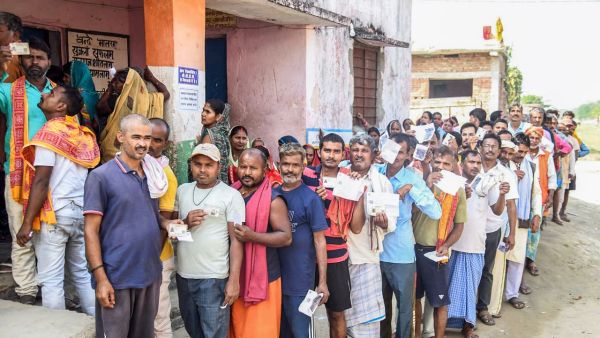
Bihar’s first phase of assembly elections witnessed a provisional voter turnout of 64.46 per cent on Thursday, Chief Electoral Officer Vinod Singh Gunjiyal said. Citizens across 121 constituencies exercised their franchise, with 3.75 crore voters eligible to decide the fate of 1,314 candidates.

Polling was held across 45,341 booths, of which 36,733 were in rural areas. “Voting began at 7 am and concluded at 6 pm amid tight security. Around 64.46 per cent voter turnout was recorded,” Gunjiyal said. He reported that 143 complaints were received and immediately resolved. While polling passed off peacefully, a few minor scuffles were reported in Lakhisarai and Saran, and certain booths in Buxar, Fatuha, and Suryagarha were boycotted.
The remaining 122 seats of Bihar’s 243-member assembly will go to polls on November 11, with counting scheduled for November 14.
For first-time voters like 23-year-old Bhavya Singh, the day was more than marking ink on her finger. “I felt more excited being part of a democratic exercise in pursuance of choosing the next government than seeing the indelible ink daubed on my finger,” Bhavya was quoted as saying in a PTI report.
A master’s student in commerce from an open university, Bhavya emphasized that her participation was driven by the hope of meaningful governance. “If the party I voted for comes to power, it is good, but even if it doesn’t, and another one takes its place, I will be fine, as I have taken part in the democratic process that would result in it,” she added.
She, along with her elder brother Shivam Pratap Singh, 28, and mother Rekha Singh, voted in Patna’s key Kumhrar constituency, where voter turnout in the afternoon was still low.
Bhavya highlighted the persistent challenges for youth in Bihar. “Now, there are more opportunities for women in sports and education. But when it comes to higher education or labour or skilled jobs, our resources and talent continue to get lost to other states due to migration in search of a better livelihood,” she said.
She stressed that whichever government comes to power must focus on curbing migration by providing quality jobs and higher education within the state.
Bhavya also critiqued the ongoing caste-based politics in Bihar. “Even 70 years after independence, caste-based politics is still in vogue and exploited by political leaders for immediate gains,” she said.
She also demanded stricter measures against paper leaks in examinations, which she described as a persistent hurdle to fair opportunities.
Shivam, her brother, echoed her concerns, emphasizing the importance of education in shaping electoral decisions. “Many voters make wrong decisions due to lack of proper education and awareness,” he said. “By education, I mean a holistic education, when a person makes a sound electoral choice driven by reason and thinking through, rather than getting swayed by others' opinions or worse voting just in the name of caste.”
He added that media, especially television, plays a significant role in informing citizens and ensuring they vote without bias, based on facts and sound judgment.
Other first-time voters in Patna constituencies such as Bankipore, Patna Sahib, and Digha shared similar aspirations but varied in their political allegiance. Some expressed satisfaction with the current government, while others felt a change was inevitable. A few noted that a “third option” in the form of the Jan Suraaj Party had emerged.
19-year-old Shruti Mishra, voting for the first time in Kumhrar, called for urgent attention to education, healthcare, and urban cleanliness. “I want the next MLA to be a sensitive person who can raise women-specific issues and personally visit households, if need be, to ensure there is no domestic violence,” she said.
Both Shivam and Bhavya agreed that Bihar’s law and order situation is much better than the image propagated in media or compared to two decades ago. “To vote for someone just because someone is raising a bogey of the past will not be wise,” Shivam added.
During the election campaign, senior BJP leaders and Prime Minister Narendra Modi, key constituents of the ruling NDA along with JD(U), targeted RJD and the opposition INDIA bloc over alleged “jungle raj” in the 1990s. The INDIA bloc, led by RJD’s Tejashwi Yadav, countered that law and order had deteriorated under Nitish Kumar’s government over the past two decades.
Both NDA and INDIA bloc manifestos highlighted education, healthcare, employment, and industry. The ‘Mahagathbandhan’ pledged a law to provide government jobs to one member per family within 20 days of forming government. Tejashwi said in late October that their coalition would establish a government focused on “padhai, dawai, kamai (education, healthcare, jobs)” and “sunwai and karwai (listening to grievances and taking action).”
The participation of first-time voters like Bhavya, Shivam, and Shruti indicates a generational shift in Bihar politics. Young voters are prioritizing education, jobs, governance, and women’s issues over caste loyalties and historical narratives. Their engagement reflects an emerging, informed electorate eager to hold leaders accountable and demand development-focused policies.
As Bihar prepares for the second phase of voting on November 11, it is clear that the energy, opinions, and aspirations of the state’s millennials and Gen Z could prove decisive in shaping its political future.